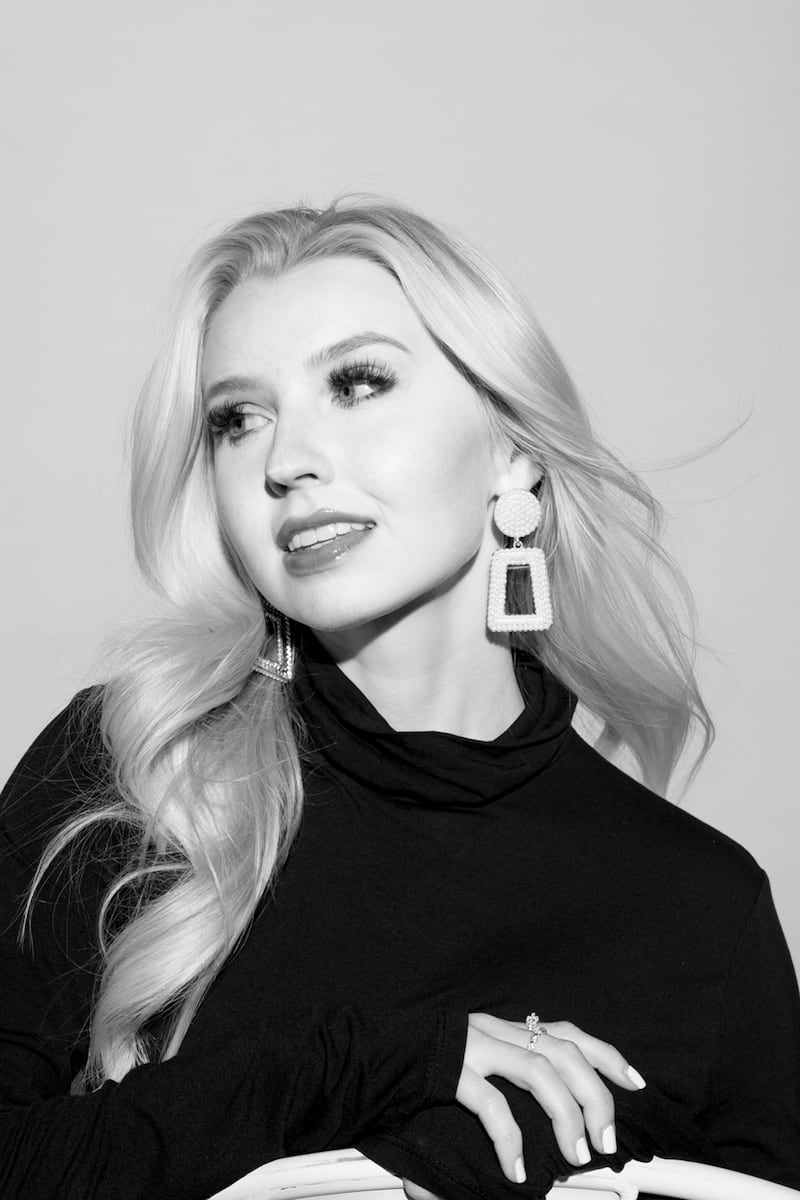“I got into music to be a voice for women and hopefully empower young girls,” Tiffany Houghton says, video chatting while lounging on the bed in her Dallas home — with her high-heeled boots perched on the plush creme bedding and her platinum blond hair framed by a pile of blue pillows. “How could I be that voice if I wasn’t in a good place? … I don’t think you can touch the hearts of others when you are not speaking from your own.”
In 2017, Houghton — a Latter-day Saint singer-songwriter with a bubbly personality and a wardrobe that would make Barbie envious — was seeing more success than ever. She had completed a tour with former pop duo MKTO during the rise of its award-nominated hit song, “Classic,” and opened for One Direction outside the Rose Bowl. She wore designer-everything — from fur coats to red-bottomed stilettos. Her original song, “Catch Me if You Can,” had recently reached the No. 1 spot on Radio Disney. It was the kind of success young musicians dream about.

But it wasn’t the fairy tale Houghton, then 24, thought it would be. After she left her childhood home in Texas to move to the big music cities of LA and Nashville, the industry took hold of every part of her. She felt like more of a product than a person. Managers, publicists and executives tried to dictate her appearance, diet and dating life. They took advantage of her — a New York radio executive demanded she come over for a “sleepover” before he would play her song on his station. She refused him, but the entire experience was enough to break the spirit of a woman whose brand was based on her upbeat jams and exuberant energy. “It was a really dark time,” she says. “I knew I needed to get out of the situation.”
Houghton says she felt like she couldn’t move forward without losing herself or her career. It was an impossible choice. Until she realized that she didn’t have to choose.
Motivated by her Latter-day Saint faith, Houghton left the Los Angeles music scene behind. She took her talent and drive with her, determined to make music she believes in. “My faith and the way that I lived protected me in so many situations throughout the years,” Houghton says. “My faith has been something that has led me my whole life. It’s always something I come back to and find value and worth in, as well as direction and guidance.”
And it’s faith that gave Houghton the courage to become a self-managed artist.
“I don’t think you can touch the hearts of others when you are not speaking from your own.”
Historically, independent and self-managed artists haven’t seen the same record-breaking fame that artists signed to big labels have. Managers help shape a musician’s image and career. Record labels control the production, distribution and marketing of music. It’s a complex system that’s hard to break out of and still see success. But social media and platforms like Spotify — where artists can share their own music and reach a wide audience — have opened up a new era of opportunities. Merchant bank Raine Group projected the independent music market would reach $2 billion in 2020, a 32% increase from the year before, thanks to the rapid growth of do-it-yourself uploads. Now, independent artists like Chance the Rapper are able to achieve massive success while being able to directly speak to their fans and put out music on their own terms.
And that’s exactly the creative freedom Houghton wants. Her new self-titled album, slated to be released April 16, is the labor of nearly three years of self-reflection. The songs were inspired by her pile of journals and composed spending countless hours at the piano. Houghton worked with producer friends to mix the tracks and give the music life — going over melodies, rewriting lyrics and tweaking sounds while wearing matching fuzzy unicorn socks from Forever 21. In between sessions, they chatted about their love lives. The studio finally felt like home. “It was a lot more of a conducive environment for creativity and to be able to speak my truth,” Houghton says.
After years of writing and discarding songs that music industry heads said were not good enough, Houghton chose the song lineup for this album based on her own artistic discretion and feedback from fans. Rather than leaving the album artwork up to stylists, she thought deeply about how she wanted to visually portray this music — which she sees as an expression of herself — and hired a photographer.
Next, she’ll work with a distribution company to get her music onto Spotify, Apple Music, Deezer, Tidal, and all the other digital streaming platforms or “DSPs.” Her marketing plan, as she puts it, is “by the bootstraps.” Houghton will personally reach out to her fans and everyone she knows in blogs, magazines, radio and music to get her new work into the mainstream.

In the end, Houghton’s debut album as a self-managed artist is exactly what she wants it to be — not what anyone else told her it had to be. It includes already-released songs like “Pretty Pretty,” about a woman’s worth beyond her physical looks, and “Spectrum,” about the diversity of experiences and emotions that make us human. And her new song “Slumber Party” tells the story of her saying “no” to that demand from the radio executive in New York.
“It took me this long to put out this album because I did not want to share,” Houghton says. “It’s hard for me to talk about all this stuff, but I am a 360, full human.”
Even though she is temporarily stationed with her husband at her childhood home in Dallas due to the pandemic, Houghton is still focusing on music-making. She has her piano in the family workout room and microphone and midi keyboard in her dad’s office. She finally has time to pursue a bachelor’s degree at the Berklee College of Music and is already making music with classmates.
Houghton loves that she can connect with her fans on social media and be authentic, no longer caught up with being a “mysterious” pop star or protecting her image. With her in-your-face enthusiasm for everything from makeup to inspirational quotes, Houghton is anything but elusive. And she’s not afraid of letting her fans in on the ups and downs of life. But that’s what followers find contagious.
It’s a big change from the period of time when Houghton was just as critical of herself as others were. But by stepping away from the conventional path to success, the now 27-year-old has more fans than ever, and in an unexpected way, she has achieved her goal of being a positive voice for young women.
Now, on a typical day in the life of the singer-songwriter, Houghton posts videos of herself bounding into Hobby Lobby with her mom or teaching a virtual voice lesson and sweetly singing “Part of Your World” from “The Little Mermaid” while a little girl on the other ends repeats the lines in her best princess voice. Houghton talks to her Instagram followers while eating a quesadilla and tells them where to buy the affordable clothes she’s wearing — a pink velour jumpsuit (from Walmart) and gold hoop earrings (Cartier look-alikes.) It may not be the picture of the pop star lifestyle she imagined for herself a decade ago when she graduated high school early and left home at 17. But it’s the one she wants.
This story appears in the March issue of Deseret Magazine. Learn more about how to subscribe.
Correction: The print version of this story incorrectly stated that a song on Tiffany Houghton’s 2021 album is titled “Sleepover.” The song is called “Slumber Party.”


 alt=Erica Evans
alt=Erica Evans